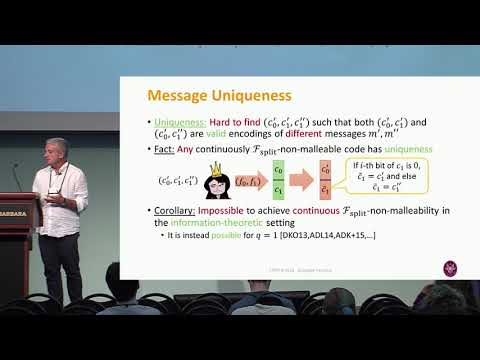CryptoDB
Continuously Non-Malleable Codes in the Split-State Model from Minimal Assumptions
| Authors: | |
|---|---|
| Download: |
|
| Conference: | CRYPTO 2018 |
| Abstract: | At ICS 2010, Dziembowski, Pietrzak and Wichs introduced the notion of non-malleable codes, a weaker form of error-correcting codes guaranteeing that the decoding of a tampered codeword either corresponds to the original message or to an unrelated value. The last few years established non-malleable codes as one of the recently invented cryptographic primitives with the highest impact and potential, with very challenging open problems and applications.In this work, we focus on so-called continuously non-malleable codes in the split-state model, as proposed by Faust et al. (TCC 2014), where a codeword is made of two shares and an adaptive adversary makes a polynomial number of attempts in order to tamper the target codeword, where each attempt is allowed to modify the two shares independently (yet arbitrarily). Achieving continuous non-malleability in the split-state model has been so far very hard. Indeed, the only known constructions require strong setup assumptions (i.e., the existence of a common reference string) and strong complexity-theoretic assumptions (i.e., the existence of non-interactive zero-knowledge proofs and collision-resistant hash functions).As our main result, we construct a continuously non-malleable code in the split-state model without setup assumptions, requiring only one-to-one one-way functions (i.e., essentially optimal computational assumptions). Our result introduces several new ideas that make progress towards understanding continuous non-malleability, and shows interesting connections with protocol-design and proof-approach techniques used in other contexts (e.g., look-ahead simulation in zero-knowledge proofs, non-malleable commitments, and leakage resilience). |
Video from CRYPTO 2018
BibTeX
@inproceedings{crypto-2018-28801,
title={Continuously Non-Malleable Codes in the Split-State Model from Minimal Assumptions},
booktitle={Advances in Cryptology – CRYPTO 2018},
series={Lecture Notes in Computer Science},
publisher={Springer},
volume={10993},
pages={608-639},
doi={10.1007/978-3-319-96878-0_21},
author={Rafail Ostrovsky and Giuseppe Persiano and Daniele Venturi and Ivan Visconti},
year=2018
}

